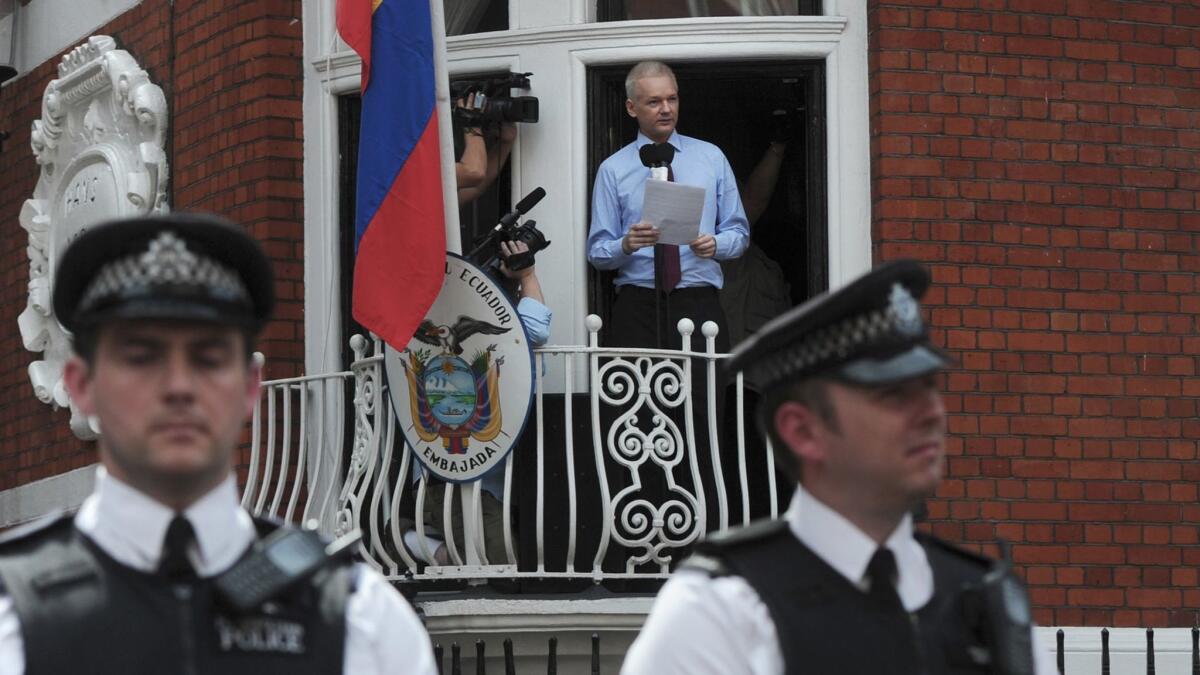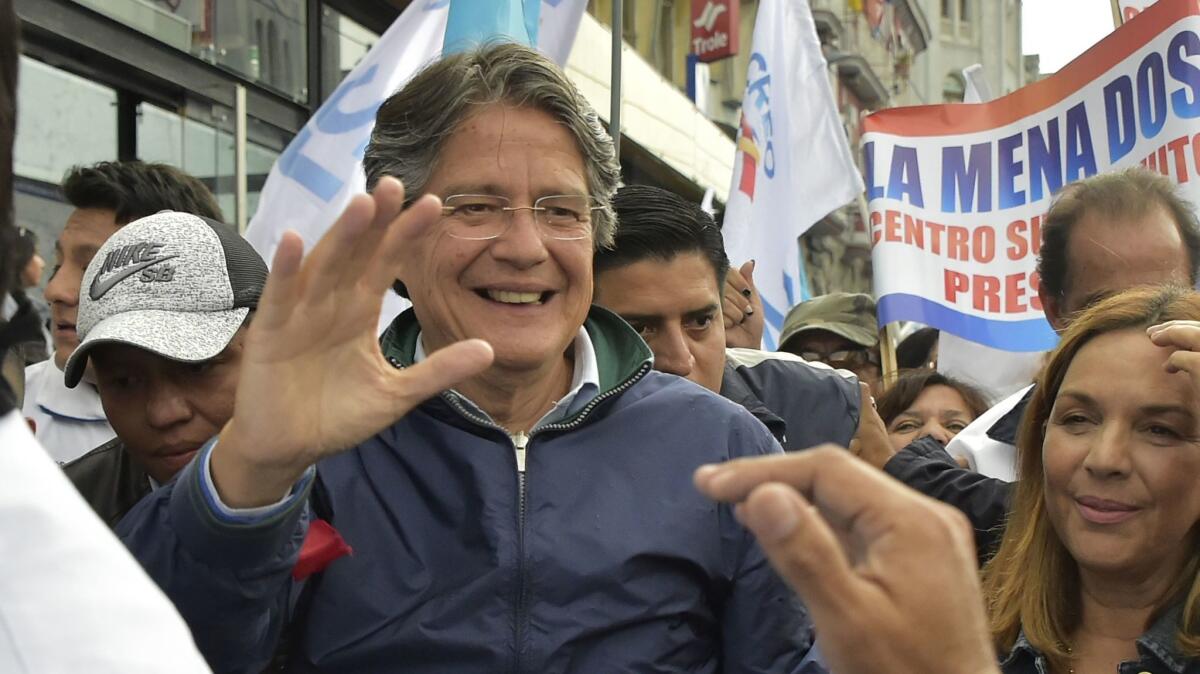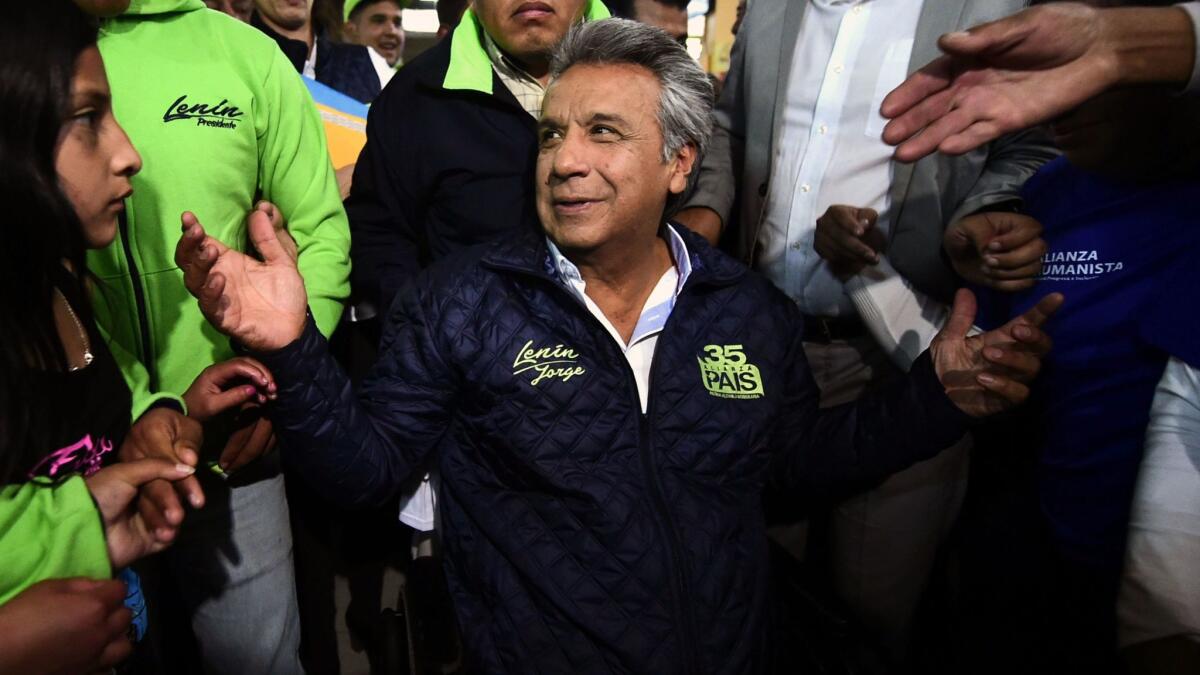When Ecuador elects a new president, will Julian Assange still have a safe haven at its London embassy?

Reporting from QUITO, ECUADOR — There’s more at stake in Ecuador’s presidential election on Sunday than whether the leftist legacy of outgoing President Rafael Correa will be extended with a victory by his former vice president.
If pro-business candidate Guillermo Lasso upsets former Vice President Lenin Moreno, WikiLeaks founder Julian Assange, who has been holed up in Ecuador’s London embassy for five years, is likely to lose his safe haven.
Correa granted Assange asylum after accepting his argument that a Swedish arrest warrant on sexual assault charges was politically motivated.
Lasso takes a decidedly different view. On Feb. 20, a day after he finished second to Moreno in the first round of presidential voting to qualify for Sunday’s runoff, Lasso was reported by Agence France-Presse as saying the London embassy “isn’t a hotel” and that Ecuador was in no position to indefinitely finance the Australian-born Assange’s care and feeding.
Lasso, a former bank executive, described Assange’s presence in the embassy as “an unsustainable situation” and said his inclination upon assuming the presidency would be to give Assange 30 days to clear out.

“The Ecuadorean people are paying costs that it shouldn’t have to,” Lasso told the Guardian newspaper.
Assange’s walking to Ecuador’s embassy in London’s tony Knightsbridge neighborhood in 2012 and asking for asylum was no random choice. That same year he had conducted an interview of Correa for an English-language Russian TV channel, and the two apparently bonded during the experience.
Also, WikiLeaks had already published information that, in Correa’s eyes, cast the United States in a bad light. In 2011, Correa had expelled U.S. Ambassador Heather Hodges after WikiLeaks published State Department cables indicating staff there thought Correa was too passive in the face of police corruption.
Over the years WikiLeaks has published millions of stolen U.S. military, diplomatic and intelligence documents. Just this month, the anti-secrecy organization shared online nearly 9,000 documents showing how the CIA conducts surveillance through various forms of technology, including computers, smartphones, cars and TVs.
During the TV interview with Assange, Correa repeatedly praised WikiLeaks and at the end of the broadcast, said to the Wikileaks founder, “Welcome to the club of the persecuted.”
Though Sweden dropped some of the sexual abuse allegations against Assange in 2015, a charge of rape against him still stands. Assange has said that he also fears that Sweden would hand him over to U.S. authorities if he were extradited to Sweden.
If Assange were forced to leave the embassy, which technically is Ecuadorean soil, he would almost certainly be arrested, said Eric Farnsworth, vice president of the Council of the Americas in Washington and a former Latin America specialist in the Clinton administration. “I think it’s pretty clear that Assange’s fate rides on Ecuador’s election returns,” Farnsworth said.
Sweden is not the only country that might want Assange captured. University of Miami international relations professor Bruce Bagley said the U.S. government under President Trump may insist that Assange answer for WikiLeaks publishing of National Security Agency secrets stolen by Edward Snowden, of Hillary Clinton’s emails allegedly hacked by Russia, and of other disclosures that “made the world see that CIA cybersecurity is a joke.”
“If Lasso wins, Assange would be wandering the streets of London and be extremely vulnerable,” Bagley said.
While President Obama declined to go after Assange because he saw it would become a “press freedom issue,” Bagley said Trump may be more inclined to try to prosecute him. “He could be brought up on charges of purveying secrets of the U.S.,” he said.
But Trump also gave Assange a shout-out of confidence in early January before he was sworn in as president. When U.S. officials said that Russian intelligence agencies attempted to interfere with the presidential election by stealing and leaking emails, Assange denied Russia supplied WikiLeaks with emails. Trump, who has repeatedly downplayed Russian efforts to influence the election, tweeted, “Russians did not give him the info!”
In Ecuador, Lasso may have taken up Assange’s stay as a campaign issue for its economic resonance, some analysts have said. He may be hoping that Moreno’s support for underwriting Assange’s continuing time in London, even as the country suffers through its second straight year of negative or flat economic growth, won’t sit well with voters.

In contrast, Moreno has been more accommodating. In his public comments, Moreno has said he would allow Assange to stay on at the embassy but ask him to be more “delicate in matters having to do with international relations, especially with countries with which we have good relations,” according to a report in El Comercio newspaper.
But for most Ecuadoreans voting Sunday, Assange’s five-year residency in the embassy is no big deal and won’t be a decisive factor in the election, said Simon Pachano, a political scientist at FLACSO, a think tank and graduate school in Quito, Ecuador’s capital. “It’s a theme that has lost topicality,” Pachano said.
Correa’s support of Assange “has hurt Ecuador’s image among some countries, but also has generated support from others who consider it a defense of human rights,” Pachano said.
Assange must be cheered by recent voter preference polls that have shown Moreno pulling away from Lasso, with one giving him a 45% to 41% edge. Still, most analysts say the election is too close to call for Moreno, even though he has the government’s electoral machinery on his side.
Ecuador has paid a price internationally for supporting Assange, Farnsworth added. WikiLeaks’ publishing of what U.S. law enforcement officials insist were Russia-backed hacks of Clinton’s emails possibly affected the election outcome and has hurt its standing as a champion of free speech, he said.
Ecuador’s hosting of Assange has hurt its relations with the United States, Farnsworth said, “but only a bit because the reality is that relations were already sour due to Quito’s intentional anti-U.S. posture.” Correa was a close friend of late Venezuelan President Hugo Chavez and often takes positions that “provoke Washington,” he said.
Special correspondents Kraul and Jaramillo Viteri reported from Bogota, Colombia, and Quito, respectively.
ALSO
A trade war is brewing inside the White House between rival camps
U.S. commander says coalition ‘probably had a role’ in mass civilian casualties in Mosul
Student exchange flap tests Taiwan’s resistance to Chinese economic pressure
More to Read
Sign up for Essential California
The most important California stories and recommendations in your inbox every morning.
You may occasionally receive promotional content from the Los Angeles Times.









